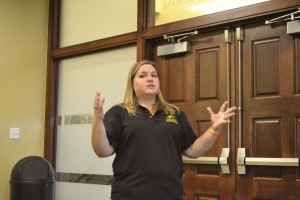
Jacob Jardel
Staff Writer
Leaders from various Cameron University student organizations learned to be better leaders at the CU Leadership Academy at 3:30 p.m. on Oct. 29 in the Buddy Green Room.
The Leadership Academy series ended with this iteration, which gave attendees advice on how to interact with the faculty advisors in various organizations.
Student Activities Specialist Leslie Cothren started the event with a rundown of some of the duties faculty advisors have in organizations as a whole, listing duties such as coordinating with treasurers and maintaining good organizational standing.
From that point, most of the conversation was attendee-driven. Throughout the event, Cothren asked those officers and members of organizations about the different facets that make good advisors as well as what traits their advisors exhibited.
The session concluded with a brief discussion on the running theme of what makes a faculty member right for an advisory job. Overall, the main message was that working with advisors differed among organizations and leaders.
According to Cothren, topics such as this one were what the Leadership Academy was about.
She said, “It is a leadership series of various topics – hopefully some personal development and some organizational development – to help students become better leaders on campus.”
This topic actually came from those leaders and organizations Cothren wanted to help.
“I’ve talked to some advisors and to some student organization presidents that kind of struggle with that sometimes, thinking ‘I don’t want to ask my advisor to do that’ or ‘I thought they were going to do that and they didn’t,’” she said.
The issue of communication was something Cothren wanted to address to those in attendance.
“I think a lot of times, there’s poor communication; so halfway through the semester, there’s a debate that goes ‘I thought you were doing that’ and ‘No, I thought you were doing that,’” she said. “I want to maybe eliminate those conversations and frustrations that happen.”
However, Cothren added that one of the keys to properly interacting with advisors is interaction and proper communication.
“I just wanted to let them know that it’s a constant conversation,” Cothren said. “There’s not actually a right or wrong way to do it. Just make sure all the areas are covered.”
Much like the advisory conversations, this Leadership Academy session went well despite the small attendance numbers according to Cothren.
She said, “Overall, it’s pretty good. The attendance has been a little lower than I wanted, and it’s not always been discussion-oriented and becoming more of a lecture concept, but I think the information is good and the people seemed receptive of it.”
In fact, she felt as if this particular topic drew a better response compared to some of the other sessions.
“I think this was a better response than a usual one,” Cothren said. “They had some really good responses. The people seemed interested. They had some of their own ideas and questions that they brought to the table, which is good. To me, it means it’s a good topic that they’ve thought about or had concern about.”
This session was the last of the semester for the Leadership Academy, but Cothren felt that there was a lot on which to build heading into the next semester.
She said that next semester’s leadership series would focus more on making mission and vision statements for the different organizational leaders, leadership book discussions, and other non-session activities.
